|
At loose in the Conservative Party at the moment appear to be 'Five Families" a reference to the Five Mafia Families of New York each with its own unique agenda and objectives. In this article, we will explore the five prominent families within the Conservative Party: the European Research Group (ERG), the New Conservatives, the Northern Research Group (NRG), the Common Sense Group, and the Conservative Growth Group. We'll delve into their origins, key figures, and their impact on the political landscape.
The European Research Group (ERG)) Once a dominant force, the ERG played a pivotal role in shaping Brexit policy and ousting Theresa May. However, its influence waned after Brexit. The group recently resurfaced, aiming to scrutinize government legislation, particularly the Rwanda policy. Led by Sir Bill Cash and Mark Francois, the ERG remains a voice on the right of the party, cooperating with other backbench groups to maintain relevance. The New Conservatives The New Conservatives, a right-wing group primarily composed of "red wall" MPs, poses a significant challenge to the government, particularly Chancellor Rishi Sunak. Led by Danny Kruger and Miriam Cates, they advocate for policies such as migration curbs and oppose "gender ideology" in schools. Their hardline stance on various issues puts pressure on the party leadership, albeit they are a relatively new caucus. The Northern Research Group (NRG) formed by northern Conservative MPs after the 2019 election, champions increased investment in the north and seeks to amplify the voices of these regions. Led by Jake Berry and Esther McVey, they demand a Cabinet minister for the North and the construction of 500,000 new homes, positioning themselves as potential "kingmakers" in future elections. Conservative Growth Group Emerging after Liz Truss's brief tenure as Prime Minister, the Conservative Growth Group advocates libertarian-style economic policies. Led by figures like Sir Simon Clarke and Dame Priti Patel, they call for cuts in corporation tax and stamp duty, easing planning regulations, and resuming fracking. While not widely publicized, their influence shouldn't be underestimated. The Common Sense Group Founded in 2020, the Common Sense Group aims to combat "woke" culture. Comprising MPs who advocate a broad range of ideals, they've been critical of organizations like the National Trust. This group, inspired by the European Research Group, has around 59 MPs and 7 members of the House of Lords in its ranks. One Nation Tories The One Nation Conservatives promote compassionate and realistic policies. Led by Damian Green, they represent centrist Tories and aim to govern within the One Nation tradition. While historically less influential, they have recently gained ground, particularly on the issue of migration. Some of their members hold positions within the government. They are excluded from the "Family Photo'.. Conclusion These five families within the Conservative Party in the UK illustrate the diversity of thought and priorities within the party. As they continue to shape policy and influence the political landscape, understanding their origins and key figures is crucial in assessing the future direction of the Conservative Party. Good Luck with that!
0 Comments
Introduction
In a surprising turn of events, former Prime Minister David Cameron made a remarkable return to British politics, taking up the role of Foreign Secretary in Prime Minister Rishi Sunak's cabinet. Cameron has been elevated to the House of Lords as Baron Cameron of Chipping Norton. This unexpected development has generated significant interest and speculation, as Cameron sets out to tackle pressing issues both on the domestic and international fronts. Brexit and Support for Leaving the EU One of the most remarkable aspects of Cameron's return to government is his stance on Brexit. Despite leading the "Remain" campaign during the 2016 EU referendum, he has now voiced strong support for the decision to leave the European Union. In his own words, "I fully respect the will of the British people”. My objective is to make Britain "secure and prosperous in a difficult and dangerous world.” Critics within the party will still consider him to be a closet remainer. Foreign Aid Policy Another critical area of focus for Cameron is foreign aid. He has been an advocate for maintaining the UK's commitment to spending 0.7% of GDP on foreign aid, emphasising the importance of international development and humanitarian efforts in a global context. HS2 Project Cameron's return has also raised questions about his stance on domestic infrastructure projects, particularly HS2. While in office, he championed the high-speed rail project, and it remains to be seen how supportive he can be on the government stance on infrastructure investment now. . China Relations With China's rising influence on the global stage, Cameron's role as Foreign Secretary places him in a position to shape the UK's relations with the global superpower. His approach to balancing economic interests with human rights concerns will be closely watched. Cameron is considered to be a Sinophile, drinking Beer in the Pub with President Xi Jinping on his visit to the UK in 2015. During his visit, he and then-Prime Minister David Cameron visited The Plough at Cadsden, a pub in Buckinghamshire. The visit to the pub was an informal and friendly gesture to showcase British hospitality and strengthen diplomatic ties. The European Court of Human Rights Cameron's tenure as Foreign Secretary also presents an opportunity to address the UK's relationship with international bodies such as the European Court of Human Rights. His perspective on the court's jurisdiction and its impact on British law will be pivotal. Cameron is considered to be a supporter of the The European Court of Human Rights and the UN commission on Human rights, Confronting UKIP's Legacy David Cameron famously described UKIP members as "closet racists and fruitcakes" during his time as Prime Minister. His return may provide an opportunity to address the legacy of UKIP and its impact on contemporary British politics. Conclusion David Cameron's return to government as Foreign Secretary marks a significant moment in UK politics. His evolving positions on Brexit, foreign aid, HS2, China, and international institutions will shape the nation's foreign policy landscape. With a clear objective of securing Britain's prosperity in a complex world, Cameron's role will undoubtedly be a subject of intense scrutiny and debate in the coming months and hopefully years. " Great Britain: Secure and prosperous in a difficult and dangerous world." On Wednesday the U.S. Federal Reserve held interest rates unchanged. The target range for the Fed Funds Rate was maintained at 5.25% and 5.5%. The formal statement issued by the FOMC was cautious and guarded.
"The Committee would be prepared to adjust the stance of monetary policy as appropriate if risks emerge that could impede the attainment of the Committee's goals." Risk sentiment in markets was boosted as the central bank revealed policymakers were penciling in at least three rate cuts next year according to the latest Blue Dot Plot. The average rate projection was 4.5% by the end of the year compared to 5.0% in September. On Thursday, both the Bank of England and the European Central Bank also kept interest rates unchanged. Governor Andrew Bailey pushed back against market expectations of early rate cuts next year. Retaining the hawkish guidance that monetary policy is "likely to need to be restrictive for an extended period of time." Christine Lagarde also waved off hopes of early rate cuts from the ECB. Headline inflation may have fallen and the growth outlook may have weakened but domestic inflation remained high. Wage growth levels (a major drive of domestic inflation) were incompatible with the inflation target of 2%, she said. Fed Offers Sobering Message ... In the news conference on Wednesday, and in written statements following, the Fed did what it could to restrain the Wall Street bulls. "It's far too early to declare victory and there are certainly risks still facing the economy", Jerome H. Powell, the Fed chair, said. The Fed indicated that it was too early to count on a "soft landing" for the economy. A reduction in inflation without a recession is increasingly the Wall Street consensus. Inflation, the glaring economic problem at the start of the year, has dropped sharply thanks, in part, to steep interest rate increases and a drop in energy prices. The Consumer Price Index rose 3.1 percent in the year through November. That was still substantially above the Fed target of 2 percent, but way below the inflation peak of 9.1 percent in June 2022. Producer prices were up just 0.2% in November. An early decline in the federal funds rate, the benchmark short-term rate that the Fed controls directly, isn't a sure thing but stocks shot higher anyway, with the S&P 500 on the verge of a record. Christine Lagarde Struck A Hawkish Tone ... The European Central Bank left interest rates unchanged at a record high of 4 per cent this week. Christine Lagarde, president of the ECB, struck a hawkish tone after Thursday's decision, saying "Should we lower our guard? We asked ourselves that question. No we should absolutely not lower our guard. We did not discuss rate cuts at all. No discussion, no debate." While acknowledging that underlying price pressures were easing, Lagarde said domestic inflation, largely driven by wage costs across the twenty countries that use the euro, was "not budging". Future inflation risks ranged from geopolitical tensions that could push energy prices higher in 2024 through to more extreme weather that could damage next year's harvests, she added. Governing Council member Francois Villeroy said "In mountains there are peaks and descents and there are plateaus. Today we are on a plateau and we need to give ourselves time to enjoy the view, to appreciate the effects of monetary policy." "Barring shocks or surprises, rate hikes are over but that doesn't mean a quick rate cut is coming", Villeroy said Friday. Bailey warns rates may need to rise again ... Governor Andrew Bailey says he can't say definitively "that interest rates have peaked". The Bank of England has signaled it may not be finished raising interest rates as Bailey warned there was "still some way to go" in Britain's inflation fight. The Bank said price rises were proving more stubborn in Britain than in other developed economies. CPI inflation had fallen back as expected to 4.6% in October. Service sector inflation remained high at 6.6%. Latest earnings data suggested wages were rising at the rate of 7%. A rate incompatible with the 2% CPI target. Mr Bailey said it was "too early to start speculating about cutting interest rates" as the MPC warned that "further tightening" would be necessary if price pressures persist. Hawks continue to baulk about an easing of monetary policy At the meeting, the Monetary Policy Committee (MPC) voted 6-3 to keep borrowing costs on hold at 5.25pc. Three members (Megan Greene, Jonathan Haskel and Catherine Mann) voted against the proposition, preferring to increase bank rate by a further 0.25% to 5.5%. The hawkish stance on monetary policy is at odds with the Governor's gloomy outlook on the economy. The latest ONS data suggests economic expansion was confined to just 0.2% in October. The MPC missed the opportunity to hike rates at the November meeting. The MPC is now encamped on the plateau enjoying the view. Table Mountain versus the Matterhorn policy perhaps. The hawkish stance is also incompatible with a government up for re-election next year. Calls for the Bank to ease off on interest rates are likely to grow in the months ahead. The Tories are already over twenty points behind in the polls. The Bank may just be able to offer a rate cut in the Spring. But unlike the election, it will be close run thing. Want to know more? Check out our Friday Forward Guidance updated every week. https://www.thesaturdayeconomist.com/friday-forward-guidance.html "I'm not tetchy" barked the Prime Minister. The British PM has been accused by both critics and allies of being bad-tempered in recent weeks. Rishi Sunak has denied being “tetchy”, insisting he just gets “frustrated” when things don’t work out as hoped.
“I don’t understand that term … there’s nothing tetchy, (about me), the prime minister told the Spectator magazine. It was as if Sunak had added a new character to the fairy tale of Snow White and the Seven Dwarfs, not Happy, Grumpy, Sleepy, Dopey, Bashful or Sneezy and certainly not Tetchy. Tracking the number of dwarfs in the original Brothers Grimm fairy tale is easy. Historical reference for the latter (with names) is provided by Walt Disney in the 1937 animation "Snow White and the Seven Dwarfs". Tracking the number of families in the Conservative party is becoming more difficult. There would appear to be five families in the camp. A reference to the five families controlling the mafia in New York in the 1930s, including the Colombo, Gambino, Genovese, and Lucchese families. The mafia families were involved in criminal activities, including racketeering, extortion, drug trafficking and prostitution. They had a long history of organized crime in New York City, Long Island, New Jersey and Florida. The families were organised under the leadership of a "Capo dei Capi" but a series of assassinations, led to the abandonment of the role (it was too high risk) and a more democratic structure was put in place under a mafia "commission". So what of the Tories? The five families of the Conservative party include the European Research Group (ERG), the New Conservatives, the Northern Research Group (NRG), the Common Sense Group and the Conservative Growth Group. On the sideline for the moment appear to be the "One Nation Tories", and the ABR "Anyone But Rishi" Group. Key questions remain. Under the five family structure, is Sunak the high risk capo di capi or is the Tory Back Bench 1922 committee the "Commission?" Some suggest “The ‘five families’ thing is complete bullshit. It is something that Mark Francois (leader of the ERG) and John Hayes, (leader of the Common Sense Group) like, because it makes them feel personally important." So what happened to the great Rwanda debate? According to Iain Martin in The Times, "After all the pompous huffing and puffing, all the ultimatums and dark threats, the Tory Right’s great Rwanda rebellion against Rishi Sunak that was meant to rock the government, or perhaps even bring it down, turned out to be a parliamentary peashooter." The bill was passed with a majority of 44. There appeared to be thirty or so abstentions from the Tory "Cosa Nostra". It was Shakespearean event more comedy than drama. "Much ado about nothing" just about sums it up. They're maybe a second act in the third reading of the bill to follow. By then the Tories will realize the threat of a stay on the Bibby Stockholm, is a greater deterrent than any flight to Rwanda. It was Priti Patel who opted for the Rwanda solution apparently. It was a choice between the Falkland Islands and Stockton on Tees. In the end the African nation become the deportation option of choice. There were fewer Tory voters in residence.
OK there were some drawbacks to the Rwandan option. Human rights abuses and political repression featured. Some might feel, a country with a history including the 1994 genocide wasn't exactly a safe option. Issues of "Refoulement" held sway. Refoulement refers to the act of forcing a refugee or asylum seeker to return to a country where they are likely to face persecution or danger. It is a fundamental principle of international law forbidding a country receiving asylum seekers from returning them to a country where they would be at risk. Rwanda has a history of refoulement. The UK Supreme Court ruled that it would be unlawful to remove refugees to Rwanda due to the risk of refoulement, concluding Rwanda is not a "safe" option. Rishi Sunak, was never a great fan ... At origin, Rishi Sunak, as Chancellor of the Exchequer was never a great fan. According to Matt Chorley in the Times, "Sunak hated the daft idea". Sunak and his Treasury team didn't think much of the policy, privately raising concerns with Downing Street and Cabinet colleagues about whether it would work and if it provided value for money. Several people involved in the discussions said Sunak also had objections on ethical grounds. James Cleverly, Home Secretary, has been accused of calling the government's Rwanda policy "batshit". [He has repeatedly refused to confirm or deny using that term.] As indeed, he has never made derogatory remarks about Stockton on Tees, just their local MP. The plan has been widely condemned as inhumane, illegal, unworkable, and prohibitively expensive. Critics have included Tory MPs and Peers, the UN's refugee agency (UNHCR), the Archbishop of Canterbury and Gary Lineker. Sunak had the option to drop the plan but decided to "plough on" regardless. He was prepared to sack HS2 but stuck with Rwanda in his commitment to "Stop the Boats". If only had promised to halve the boats and stop inflation he might have had a get out. The option appears to be to carry on regardless in a back me or sack, unite or die message, to the Tory rank and file. The government has now paid almost £300 million to the Rwandan government to prepare for the reception of the boat people. Hotel Rwanda has been readied along with the series of luxury apartments. Patel was so impressed she almost placed a deposit herself on a room with a view of the "land of a thousand hills". Shocked by the Supreme Court Ruling ... Shocked by the Supreme Court Ruling, the prime minister is pursuing a two-pronged strategy to overcome legal obstacles thrown up the the Court Challenge. First, the government has agreed to a new treaty that guarantees migrants relocated from Britain to Rwanda will not be sent back to their home country. Promise. Second Rwanda is a safe country. The UK government will declare in law that, thanks to safeguards enshrined in the treaty, Rwanda is a "safe country". It will instruct "every decision-maker", whether a Home Office official or a court or tribunal to "conclusively treat Rwanda as a safe country" when deciding whether to remove an individual to that country. [As an addendum to the bill, the government will write into law that Kensington, is a safe place to wear an Audemars Piaget watch, with a short sleeved shirt, driving a Porsche or Ferrari in the sunny season.] The European Court of Human Rights (ECHR) has also been involved in the UK's policy regarding the removal of asylum-seekers to Rwanda. The ECHR has already intervened, granting an urgent interim measure to prevent the removal of an individual to Rwanda. Judgments are binding on the 46 Council of Europe member states that have ratified the convention. If you want to start a fight in the Tory Party shout Europe ... The hard line European Research Group were outraged. To think that a European institution should menace the sovereignty of the land of pomp and glory. Suella Braverman set out to become the champion of the hard right. "We will fight them on the beaches and on the court benches" the call to action. We will opt out of ECHR (or anything with Europe in the title) the mantra. Just as well NATO doesn't become NEATO or we would have to quit that too. The Tory"Star Chamber" the ERG's lawyers has warned the legislation is not watertight enough to prevent legal challenges and is not fit for purpose. Robert Jenrick, the immigration minister, quit in the belief that the plans were too weak. In a pointed rebuttal to the Prime Minister, he said it was "very clear" to those who understood the issues, "the Bill will not work". Speaking on BBC's Sunday Show with Laura Kuennsberg, Jenrick said a political choice had been made to "bring forward a bill that doesn't do the job". He warned section four of the Bill allowing migrants to appeal their deportation on an individual basis would lead to a range of legal claims, which will "bog down the scheme and will not create the deterrent the Prime Minister and I set out to achieve." It really is time to axe the option ... According to the latest data, around 46,000 people were detected crossing the channel in 2022. This year the number is expected to fall below 30,000. Agreements with France and Albania have assisted the drop in numbers. Stuck on a barge with legionnaires disease doesn't appeal. Sunak has halved inflation and almost halved the number of boats crossing the channel. Meanwhile, the number of immigrants entering the country legally has hit 1.3 million over the last two years. Hard to see why the obsession with sending boat people to Rwanda is so intense. Sunak's policies are set to halve inflation, halve the number of boats and halve the number of Tory MPs if continued. The Prime Minister must learn to choose his battlegrounds ... Rwanda is not the one to fight them on the back benches .... Andrew Bailey, the governor of the Bank of England, has hit back at critics who have claimed he has taken an "ultra pessimistic" view of the UK economy.
This week, Bailey painted an extremely dim picture of the UK economy, claiming that its present potential growth trajectory is the "worst" he has ever seen in his career. "I have been written up this week as being an ultra-pessimist, but I don't see it that way. I see it as a realist view,' Bailey told Staffordshire's Daily Focus newspaper. The Bank's latest forecasts indicate the economy will barely grow at all next year, or in 2025. The Governor has said the outlook for the economy is the worst he has ever seen. Britain struggles to boost low levels of growth, as taxes and interest rates rise. The Bank of England Governor raised concerns over the UK's future prospects just days after the Office for Budget Responsibility (OBR) issued forecasts for the UK economy slightly more optimistic than the Bank of England. In an interview with The Chronicle in Newcastle, Mr Bailey said: "If you look at what I call the potential growth rates of the economy, there's no doubt it's lower than it has been in much of my working life. "It does concern me the supply side of the economy has slowed. It does concern me a lot." Is The Governor Genetically Pessimistic? When asked at the OBR press conference "Why Are Your Forecasts for GDP Growth So much Stronger Than The Bank of England's November Forecasts?" Professor David Miles said (with a smile) "Because we are genetically more optimistic than the Central Bank". It's a fair point.. He then went one to say "Actually, that's not really true. The variance is best explained by the differences over the underlying trend rate of growth and assessments of total factor productivity. Adding the possibility of a possible varying stance on the future path of interest rates may also come into play. But in general the Bank has a more cautious, more conservative, more pessimistic view." Predictions of weak supply growth are one reason Mr Bailey and his colleagues on the Monetary Policy Committee (MPC) are keeping interest rates high. The governor added to warnings from Huw Pill, the Bank's chief economist, the supply side of the economy, which includes the availability of labour, could keep inflation stubbornly high over the coming years as a result of the ensuing pressure on wages. So What About Rates? The Bank of England will not cut interest rates for the "foreseeable future", Andrew Bailey has said, warning it was "too soon" to discuss the prospect of large-scale monetary easing. He warned the next stage of cutting inflation would be "hard work". So far, inflation has fallen from a peak of 11.1pc in October 2022 to 4.6pc last month, when a drop in the energy price cap pulled the headline rate down from September's 6.7pc. The Governor said the job is not done yet, and warned families not to expect any steep falls in interest rates as the Bank battles to get prices back to its 2pc target. "By the end of the first quarter next year, when a lot of that unwind will have happened, we may be a bit under 4pc (CPI) but we'll still have 2pc to go, maybe. And the rest of it has to be done by policy and monetary policy. And policy is operating in what I call a restrictive way at the moment." He stressed that this requires rates to stay at their current level of 5.25pc for some time, despite the pain it inflicts on borrowers. He said: "I am very conscious of the position of the less well-off but we do have to get it down to 2pc and that's why I have pushed back of late against assumptions that we're talking about cutting interest rates or we will be cutting interest in anything like the foreseeable future because it's too soon to have that discussion." Financial markets are currently betting that the first rate cut, from 5.25pc to 5pc, will come in the summer of 2024. Bailey and other Bank rate-setters have recently pushed back against financial market speculation that indicates at least two rates cuts before November next year, taking the base rate to around 4.75 per cent. That ain't go to happen says the governor! Why So Gloomy? The "Sexy Turtle" will have his sway on rates ... but the OBR will have it's day on growth ... |
The Saturday EconomistAuthorJohn Ashcroft publishes the Saturday Economist. Join the mailing list for updates on the UK and World Economy. Archives
July 2024
Categories
All
|
| The Saturday Economist |
The material is based upon information which we consider to be reliable but we do not represent that it is accurate or complete and it should not be relied upon as such. We accept no liability for errors, or omissions of opinion or fact. In particular, no reliance should be placed on the comments on trends in financial markets. The presentation should not be construed as the giving of investment advice.
|
The Saturday Economist, weekly updates on the UK economy.
Sign Up Now! Stay Up To Date! | Privacy Policy | Terms and Conditions | |
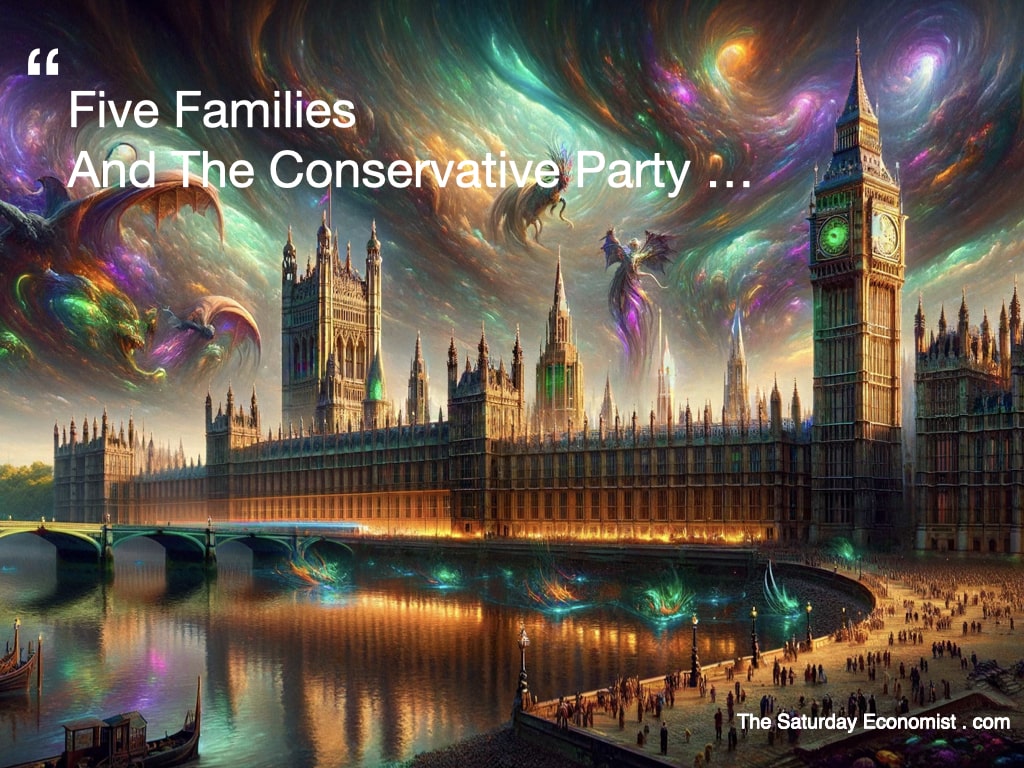
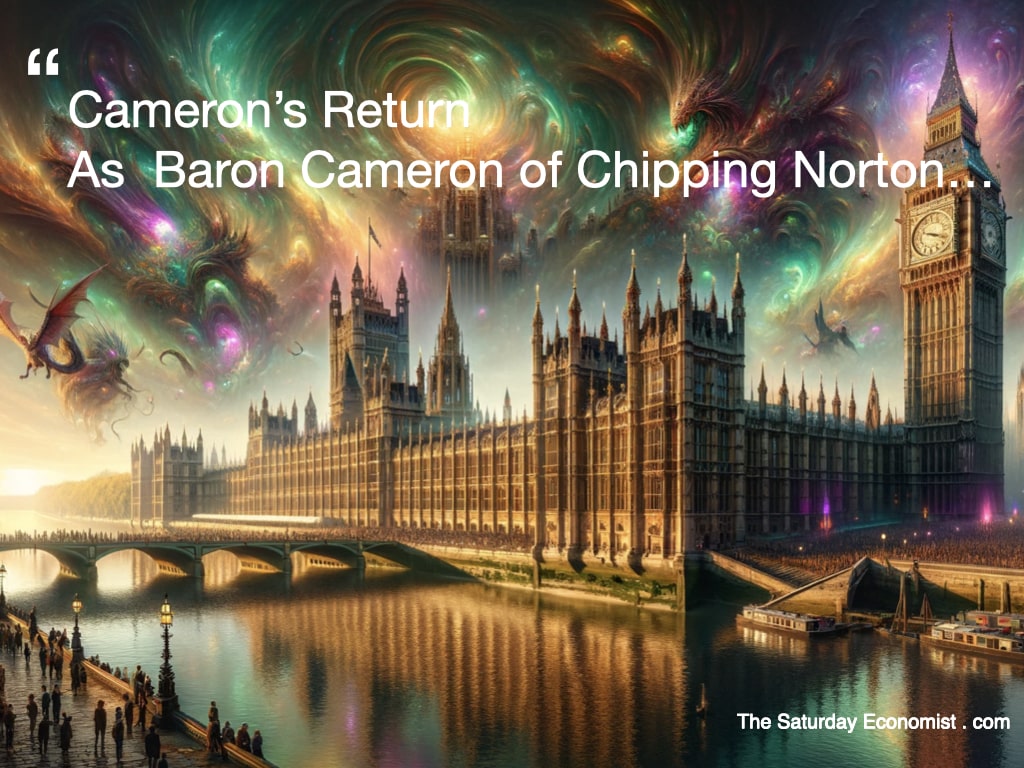
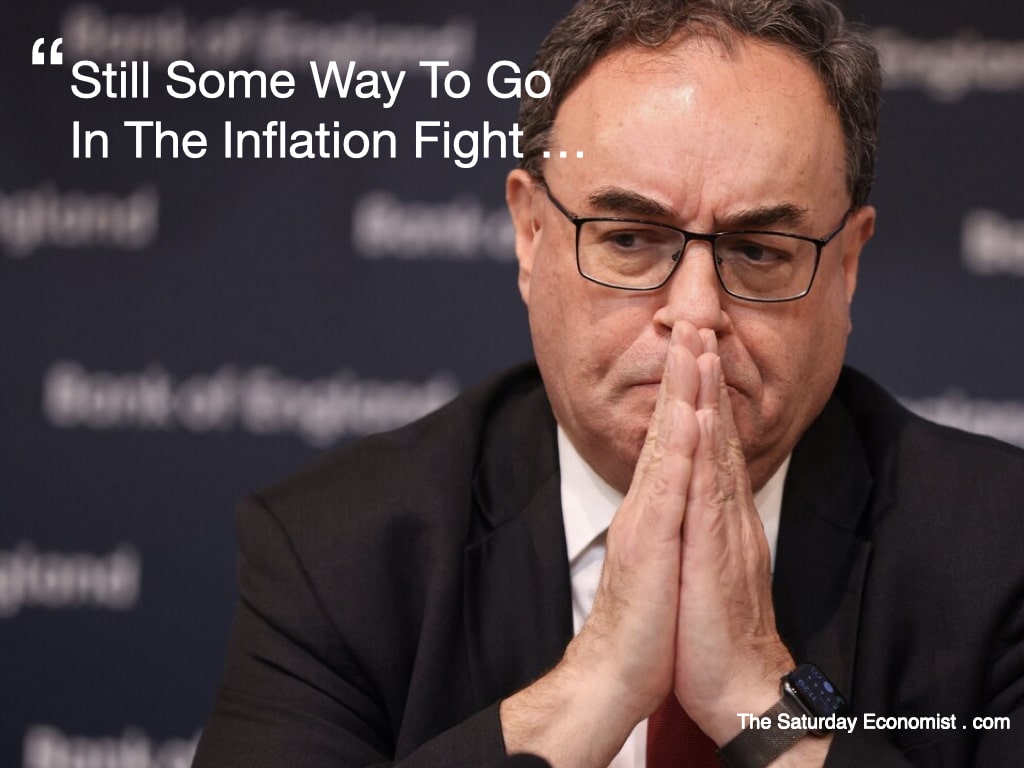
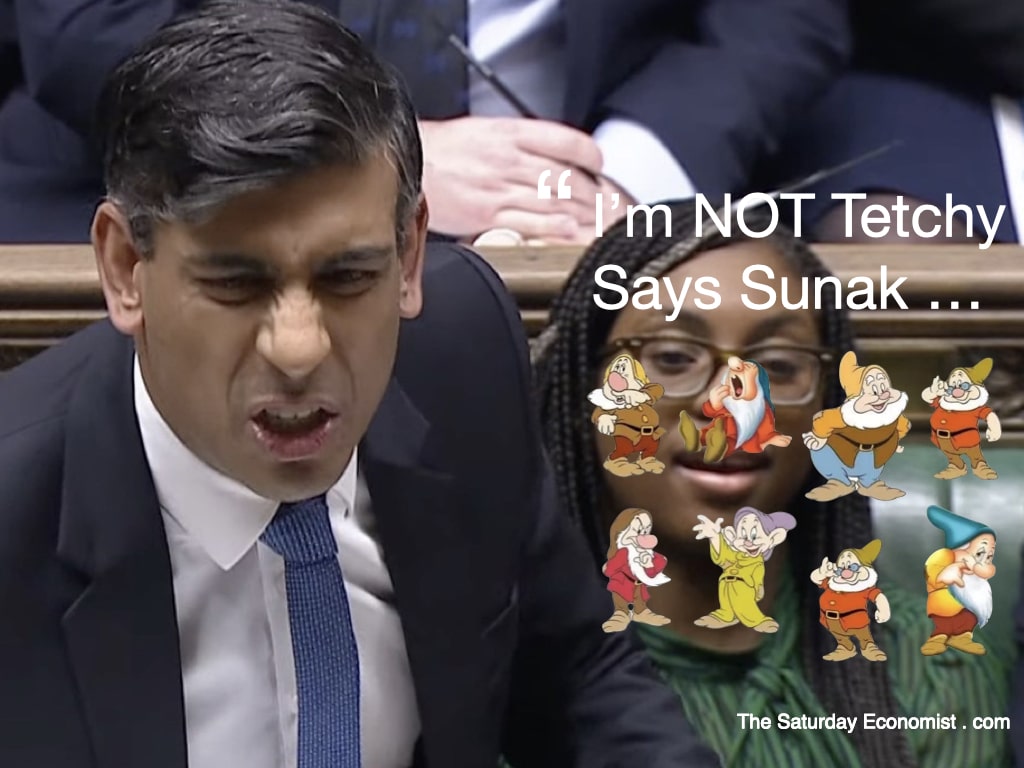
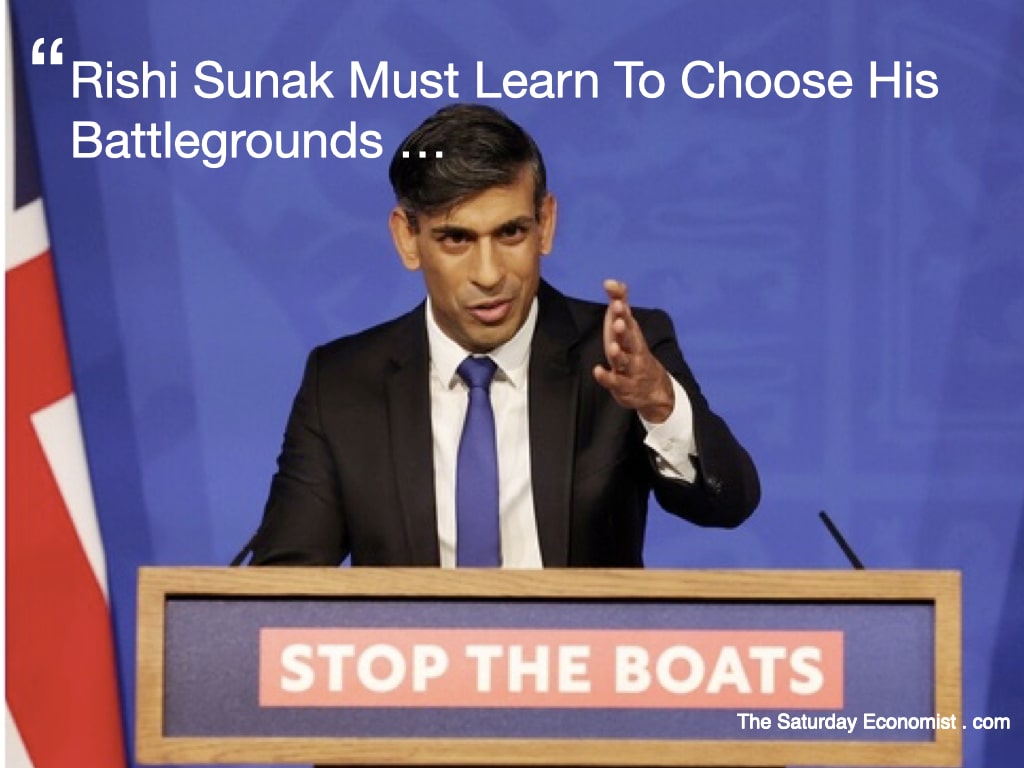
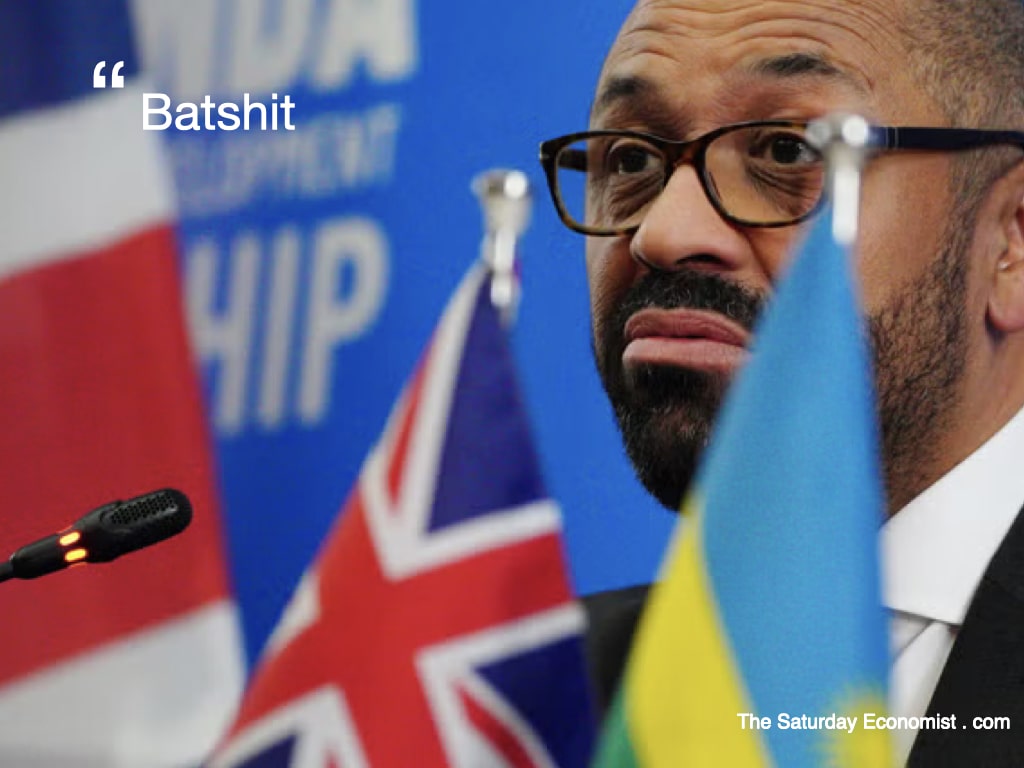
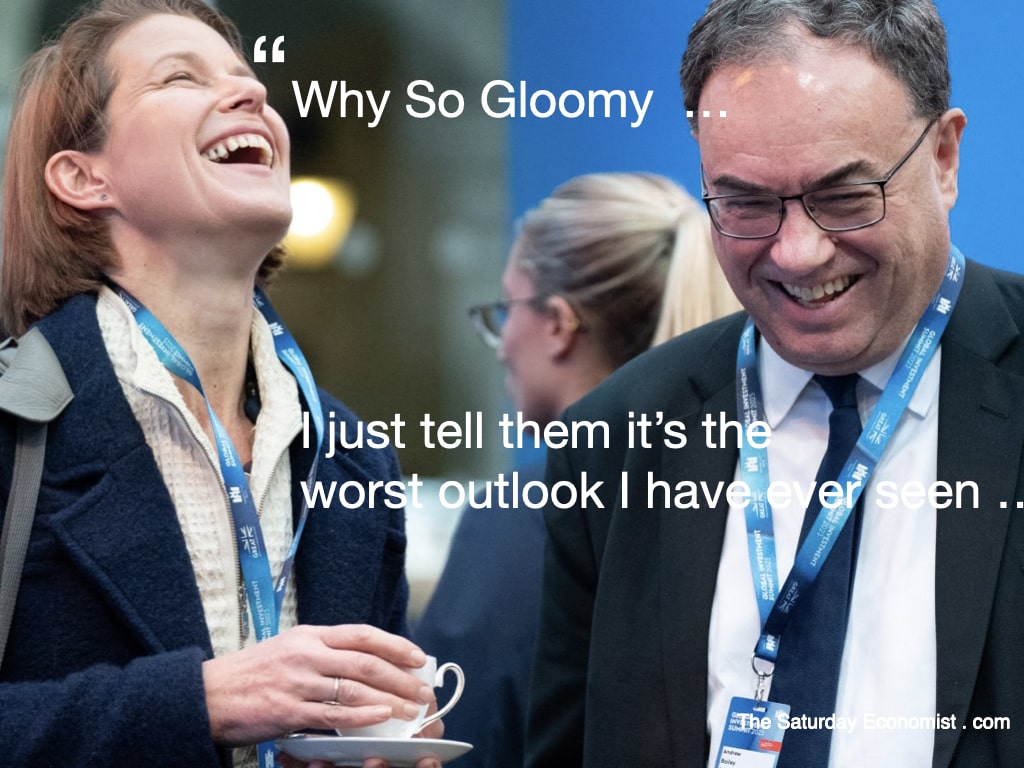
 RSS Feed
RSS Feed